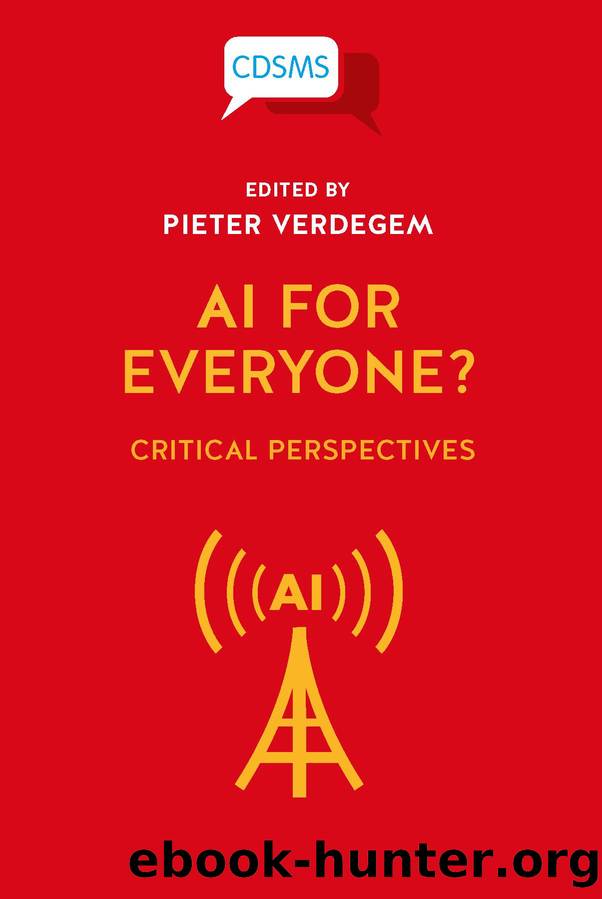AI for Everyone? by Pieter Verdegem

Author:Pieter Verdegem
Language: eng
Format: epub
ISBN: 9781914386145
Publisher: University of Westminster Press
Developing AI in Europe
The journey to develop the AI strategy in the EU started in 2018, when the European Commission presented the âDeclaration of Cooperation on AIâ now signed by all 28 Member States, including Norway. In the Declaration, Member States agree to a continuous dialogue to work together towards âa comprehensive and integrated European approach on AI and, where needed, review and modernise national policies to ensure that the opportunities arising from AI are seized and the emerging challenges addressedâ (EU Declaration 2018: 4).
The AI strategy is developed within the context and legislative packages of the Digital Single Market Strategy developed by the EC that include the European Data Economy initiatives, the General Data Protection Directive and, crucially, the European Cloud Initiative. The latter aims to âmake it easier for researchers, businesses and public services to fully exploit the benefits of Big Data by making it possible to move, share and re-use data seamlessly across global markets and borders, and among institutions and research disciplinesâ (European Cloud initiative 2019).
On 7 December 2018 the European Commission published a coordinated action plan on the development of AI in the EU (European Commission 2018a, 2018b). It pledged to increase its annual investments in AI by 70% under the research and innovation programme Horizon, in order to reach EUR 1.5 billion for the period 2018â2020. In its Communication (European Commission 2018a) the European Commission (EC) reaffirms the belief that âAI will help us to solve some of the worldâs biggest challengesâ, from treating chronic diseases and reducing fatality rates in traffic accidents to fighting climate change and anticipating cybersecurity threats (European Commission 2018a, 2). Therefore, the EC put forward a European approach to artificial intelligence based on three pillars:
⢠connect and strengthen AI research centres across Europe;
⢠support the development of an âAI-on-demand platformâ that will provide access to relevant AI resources in the EU for all users;
⢠support the development of AI applications in key sectors (European Commission 2018b, 1).
In order to support the development of the AI strategies summarised here, the EC established two advisory entities: The High-Level Expert Group on AI (HLEG); and the European AI Alliance. The High-Level Expert Group on AI is charged with developing proposals for the overall EUâs AI strategy, policy and priorities. It comprises 23 members from industry, 19 from academia and 10 from civil society; and it is further divided into two working groups: one on ethics; and one on investment and policy. The second advisory entity, the European AI Alliance, is a multi-stakeholder online platform. On the platform, EU members can contribute to ongoing discussions on Al, feeding into the European Commissionâs policy-making processes. The European AI Alliance is conceived as a tool open to all members of society. Currently, it is composed of members from civil society, trade unions, companies, not-for-profit institutions and consumer organisations.
In the first year after its creation in June 2018, the HLEG released two major policy documents forming the basis of the latest White Paper on AI, adopted in 2020.
Download
This site does not store any files on its server. We only index and link to content provided by other sites. Please contact the content providers to delete copyright contents if any and email us, we'll remove relevant links or contents immediately.
Exploring Deepfakes by Bryan Lyon and Matt Tora(8365)
Robo-Advisor with Python by Aki Ranin(8305)
Offensive Shellcode from Scratch by Rishalin Pillay(6427)
Microsoft 365 and SharePoint Online Cookbook by Gaurav Mahajan Sudeep Ghatak Nate Chamberlain Scott Brewster(5678)
Ego Is the Enemy by Ryan Holiday(5409)
Management Strategies for the Cloud Revolution: How Cloud Computing Is Transforming Business and Why You Can't Afford to Be Left Behind by Charles Babcock(4562)
Python for ArcGIS Pro by Silas Toms Bill Parker(4502)
Machine Learning at Scale with H2O by Gregory Keys | David Whiting(4289)
Elevating React Web Development with Gatsby by Samuel Larsen-Disney(4222)
Liar's Poker by Michael Lewis(3439)
Learning C# by Developing Games with Unity 2021 by Harrison Ferrone(3350)
Speed Up Your Python with Rust by Maxwell Flitton(3310)
OPNsense Beginner to Professional by Julio Cesar Bueno de Camargo(3278)
Extreme DAX by Michiel Rozema & Henk Vlootman(3256)
Agile Security Operations by Hinne Hettema(3189)
Linux Command Line and Shell Scripting Techniques by Vedran Dakic and Jasmin Redzepagic(3170)
Essential Cryptography for JavaScript Developers by Alessandro Segala(3141)
Cryptography Algorithms by Massimo Bertaccini(3082)
AI-Powered Commerce by Andy Pandharikar & Frederik Bussler(3040)
